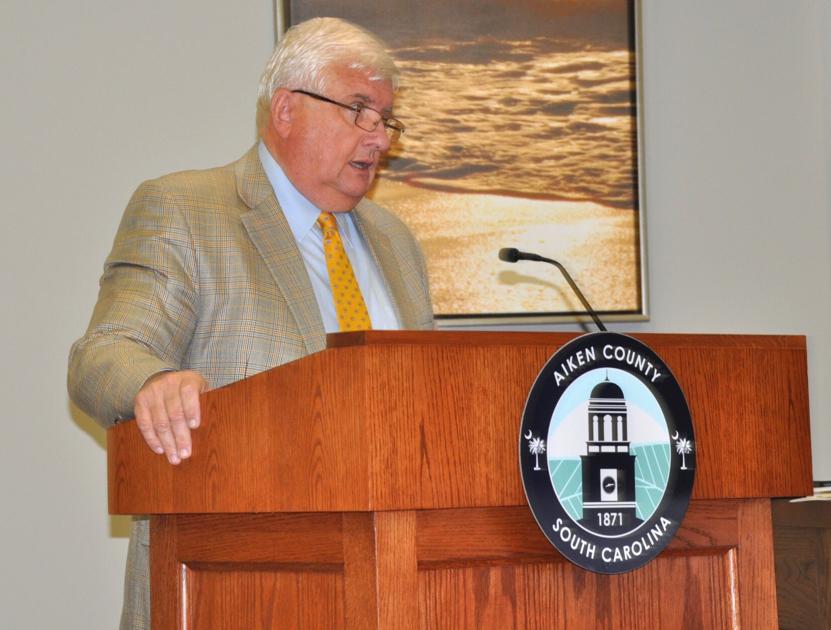The new coronavirus pandemic has not had a significant impact on Capital Project IV Sales Tax revenues so far, based on the latest available figures provided by Aiken County Administrator Clay Killian for the Aiken Standard.
As of November 2020, the county has received a total of $ 34,052,374 from the South Carolina Revenue Department since the start of the CPST IV charge in spring 2019.
This amount was above the projected value of $ 33,128,584.
The county receives money from the Revenue Department on a quarterly basis, but the three-month intervals do not exactly correspond to the calendar year.
COVID-19 began disrupting everyday life in South Carolina last March.
CPST IV’s revenue from March 2020 to May 2020 was $ 4,740,468, which fell short of the projected total of $ 5,423,350.

That period was when “the governor (Henry McMaster) allowed people to delay their reports and delay filing sales tax returns,” said Killian.
From June 2020 to August 2020, revenues were $ 6,006,368, which exceeded the projected value of $ 5,196,403.
Revenue from September 2020 to November 2020 was $ 5,489,181, which exceeded the projected total of $ 5,412,920.
“Even if the pandemic continues, it (the money received from CPST IV) appears to be remaining stable,” said Killian. “Things have really remained stable.”
In November 2018, voters in Aiken County overwhelmingly approved CPST IV, which is also known as a local option sales tax of 1 cent, 1% or cent.
It is the most recent iteration of a fee approved locally for the first time in 2000. The second version was approved in 2004 and the third was approved in 2008.
After being received by the county’s Department of Revenue, CPST IV revenues are divided between the county, the cities of Aiken and North Augusta and eight small counties: Burnettown, Jackson, Monetta, New Ellenton, Perry, Salley, Wagener and Windsor .
A formula based on population and point of sale determines how the money is divided.
The seven-year collection period for CPST IV began on May 1, 2019 and will continue until April 30, 2026.

The funds for the plots of the small municipalities have already been raised.
When county residents voted for CPST IV, it was expected to generate about $ 163 million in total.
The money can be used for a variety of projects, including paving roads, renovations and building construction.
Initially, during the pandemic, there was concern about the sharp and lasting decline in CPST IV revenue, said Killian.
What happened instead was a pleasant surprise for him and other government officials.
“Obviously, people continued to buy durable goods, whether online or not – where (they bought them from) we don’t know why we don’t get (information on) where these collections come from,” said Killian. “All online retailers must collect sales taxes, and I think most of them do.”
In 2018, the county’s participation in CPST IV was estimated at about $ 75.3 million, which would represent 46.24% of projected earnings.
“If (the pandemic) gets worse and we close again or if the governor allows delays in reporting, that will change the numbers,” said Killian. “But now, we don’t expect any of this to happen. And hopefully, with the vaccines launched, we will see some control of the virus and things going back to normal. “
Aiken city manager Stuart Bedenbaugh and his team closely watched the profits from CPST IV.
“We were able to track revenue and when we saw that the funds were entering the level we had anticipated, we didn’t delay any of our projects,” said Bedenbaugh. “I think we were lucky. Although the general economy here certainly felt the effects of the pandemic, there was still a lot of consumer spending. ”
He was not sure why, but he mentioned some possible reasons.
It may have been because “many jobs that pay good wages have not been affected,” said Bedenbaugh.
Federal stimulus payments and increases in unemployment benefits could have helped, he added.
“Many of these tax revenues were stronger than expected during the pandemic,” said Bedenbaugh. “Our hospitality tax is running about 96% of what it was (based on revenue) before the pandemic. The accommodation tax is stronger than budgeted, but has a 20% discount. “

When CPST IV was approved, the city of Aiken was expected to receive approximately US $ 50.9 million, which would represent a share of 31.23% of profits.
